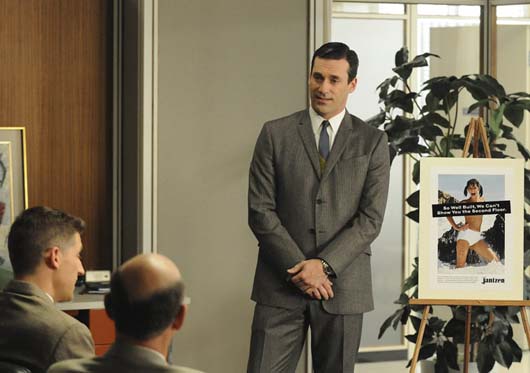
All We Want To Do Is Please You
by ELEANOR MORROW
Mad Men
creator Matthew Weiner
The idea that life itself is best treated as an artistic canvas is nothing new. Byron was the most syphilitic of artists who embraced this idea, but it has Christian beginnings, too, the concept of acting like someone else, someone who's not you, for the benefit of others and for the pleasure of God. The most recent example of this phenomenon is Don Draper, and we are just along for the ride.
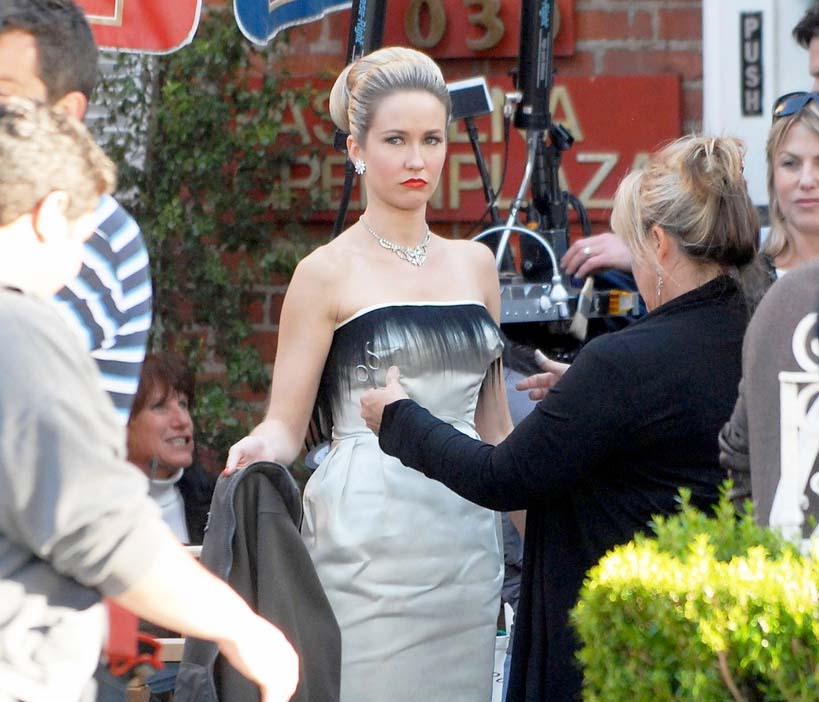
Don learns different lessons from his experiences than the public at large. He heads out on a date with Roger's wife's friend Bethany (True Blood's Anna Camp) and envies her backstage work in the theatre; he even tells her it's exciting! Don harbors a secret weird jealousy for what most of us laugh at, and this is the key to understanding this most loathsome of men. And Don is horrible. They have toned it down a lot by making him seem nice to his kids and whores, but he's about as pleasant as a burned roast.
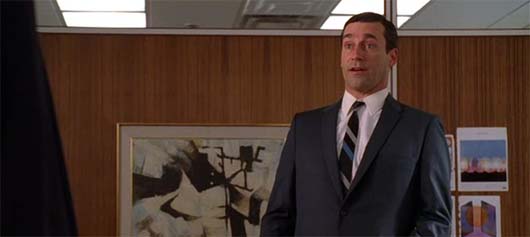
Don's belief is that he can step into the role of the consumer like no other. He regularly sews and gets out his shinebox like he's nostalgic for the Depression. Romanticizing the past is a common American problem, and since Don hates his past, all he has are the gestures and the skills of poverty. What was the good life for him? When he forever ruined his kids' elementary school teacher for other men?

Draper is unique in that he really has no golden time to look back on. We've never seen the halcyon days after the Drapers were first married (although NB Weiner that'd be a good way to get January Jones a scene where she's not on her back). Years in Korea weren't exactly full of self-empowerment for the young Dick Whitman. Don has nothing to go back to, so he gets his magnetism from living continuously in the present. This modern impulse was first noticed in primitive Neanderthal tribes, once they figured out how to pay for sex.
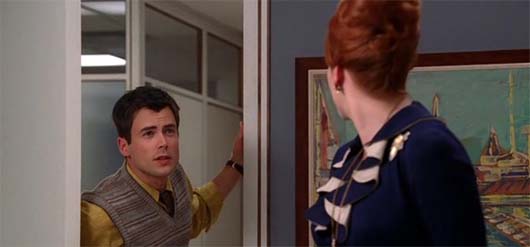
Three thousand years later (give or take), the new Sterling Cooper Draper Pryce is riding in miniature on the dark side of Don Draper's testicles. Where are all the bright shining lights in this company? What about that dude who got his story published in The New Yorker? If they debut Fred Armisen as a love interest for his real life wife, or if Maya Rudolph appears on this show in any fashion, I will call the police.
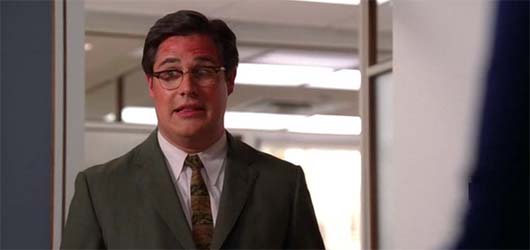
On the plus side, it's amazing Christina Hendricks found the time to act between photoshoots and interviews and Wal-Mart openings and making her homely husband eat cat food. When Mad Men's characters stop changing and become static, they lose their significance in the drama. In the case of Pete Campbell, that's not nice, that's just a nice sweater. Hopefully now that Pete's wife is a regular on Community, he can start a fledging romance with Draper's housekeeper Celia, who is amazingly the only non-white character on the show.
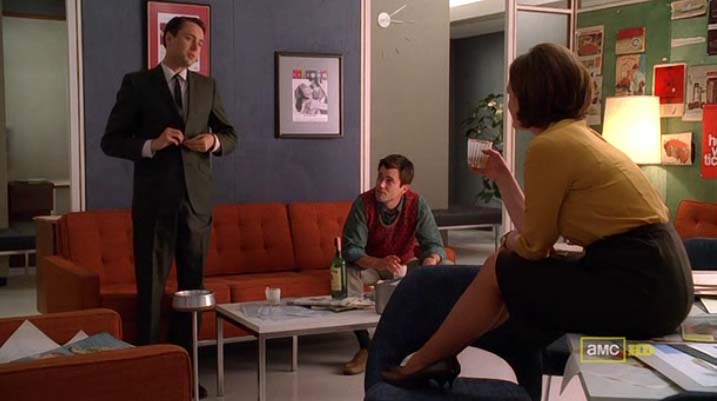
In better news, Peggy will finally get the love triangle we're all waiting for. Yes, the Church of Scientology has permitted the first male-female-male fictional love triangle in thetan history since Keeping the Faith, and Peggy's inability to decide between two foppish nerds beginning to carry her purse will likely result in her putting them both before Don and letting Satan sort it all out. Gosh bail for fighting over a ham was high in those days!
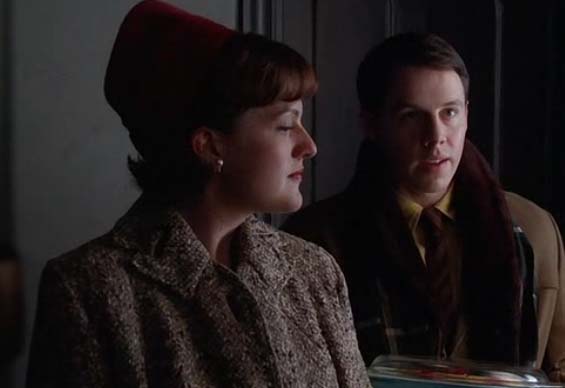
It would entertain me to no end if Peggy went through the entire plotline of Goodfellas, including hiding her cross in front of her in-laws and leaving Pete Campbell to die in the desert. Four seasons of watching her toady to Don are enough. If you can sell jai alai, you can sell anything. Don is about to have a new level of clientele; let's just hope he's done with Conrad Hilton because Lost already answered the question, "Who is Paris Hilton's father?" (Daniel Faraday.)
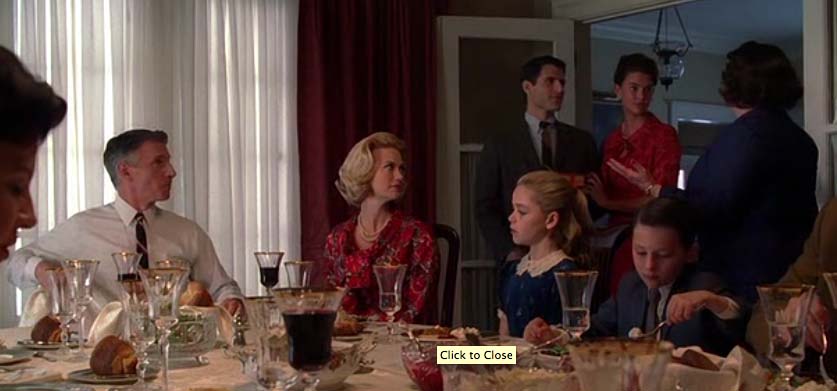
Mad Men unwittingly has taken on a new protagonist, which indicates he's probably two short episodes away from stepping in front of a bus. After undermining Don last season, Henry is ostensibly in love with Betty Draper, and he shows it by only permitting sex when his anus can casually rest on the car's gearshift. You can tell where his affection for Mrs. Draper is headed by the look in his eyes. He resembles Jack Nicholson about to flee the scene of an accident.
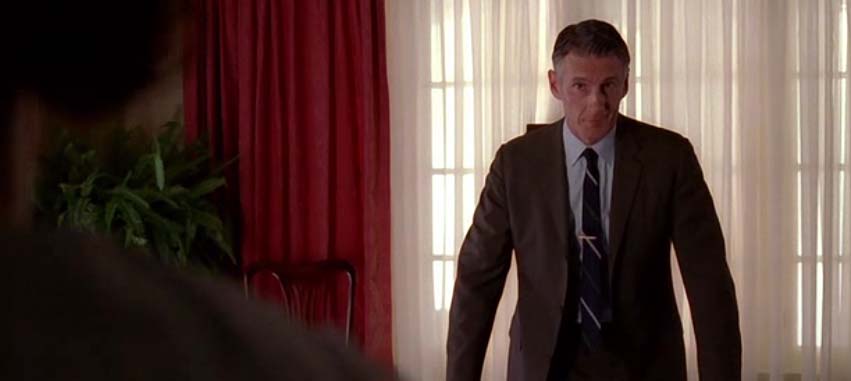
Henry's decision about whether to keep Betty Draper around takes on a new significance. It is a test of Don's world view. If Henry can't back up his big talk about wanting to be with Betty, then it doesn't matter whether anyone else can. Betty left the biggest bullshitter in the world, but he's not so bad if she left him for a bigger one.
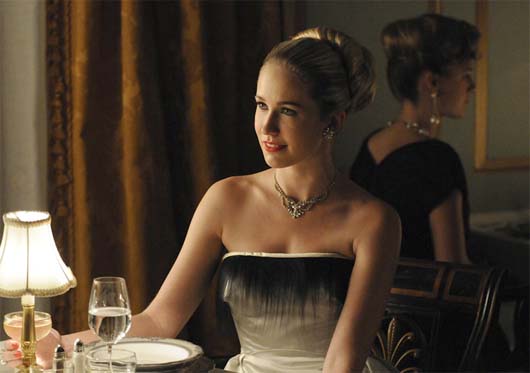
Like Don's bizarre date with Bethany Van Nuys, advertising started being condescending rather than airy and pleasant at some point, and the industry met with better results because of it. "It's not even an advertisement until the last thirty seconds," Don tells the charming vet who couldn't think of a better headline than 'A Man From a Town With No Name.'
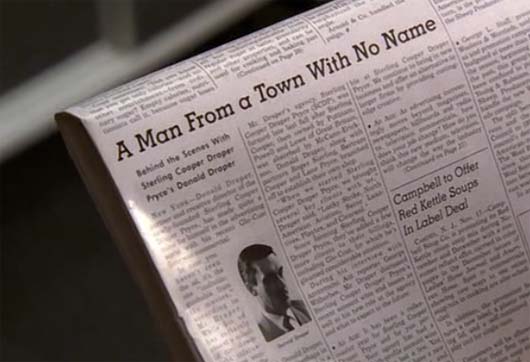
I have a list of people he could have called for that story, and it begins and ends with the guy his wife had sex with in a restaurant bathroom last season. Don was shocked that all he had to do was treat an Advertising Age reporter with one leg like he does the rest of the people in his life: as if they were something he had to wipe off his shoe.
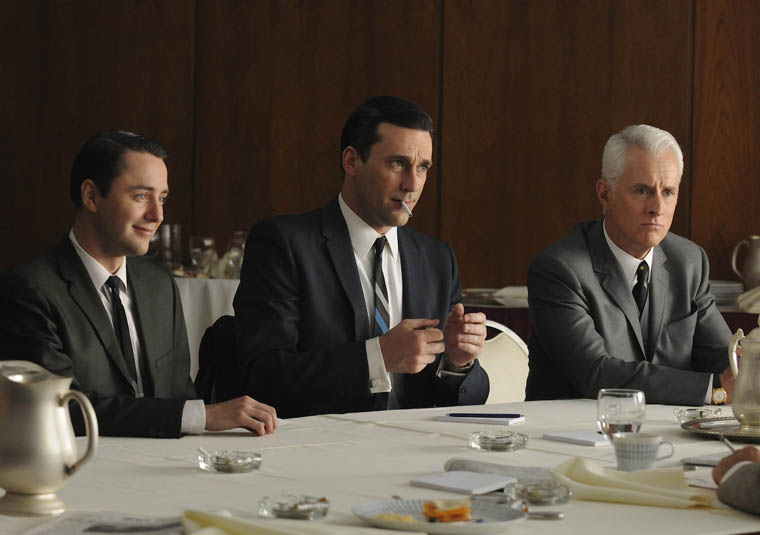
Since the beginning of time, people have secretly loved to be talked down to. Have you ever read the Ten Commandments? They sit at approximately the same artistic standard as Jeff Koons and John Slattery's acting: utterly insulting to anyone who knows about art or portraying a powerful advertising executive as he was forty years ago.
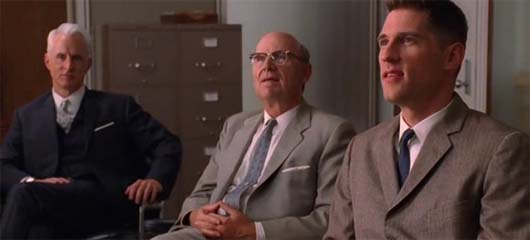
The client becomes the child because it is the client on who the advertising must succeed for the agency to get paid. A bit of random publicity for two Jewish woman fighting over the last ham isn't exactly a Super Bowl commercial — the intended effect was on the client, who told Peggy that "it's a shame someone had to get hurt, but if it means people are buying more of our wonderful hams..." Yet the idea of pleasing the client first is woefully inefficient. Why spend time seeing whether you can convince the person already predisposed to the product?
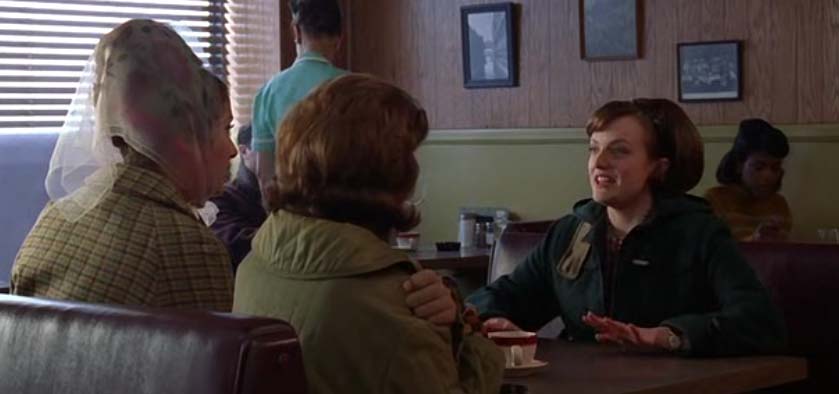
This is akin to a revelation for Don. He becomes violently angry at his swimsuit clients because they live in the past. Don Draper of course hates their aversion to convince others to buy their products, and he calls them "prudes" as if he was on his way to Point Pleasant in a one piece. Don's advertisement has no chance of pleasing the client, but he's a more artistic manipulator than that. When sales don't rise, they'll know where to turn. And if they slap him a little on the cheek during sex, he'll charge half-price.
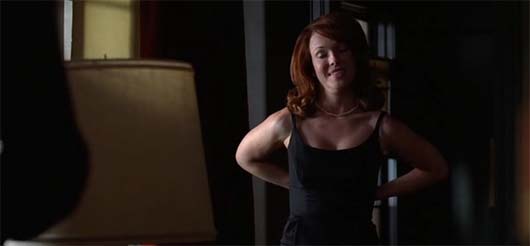
Don is changing the game by treating the client, and the man who married his wife, and his protege, and his prostitute, and a Broadway extra/Steve Newlin's wife, and Roger Sterling himself as children. His own children he already made into accessories. And why should you expect a child to turn into an adult if you haven't taught her how?
That would require thinking ahead, and Don is more like his daughter Sally than anyone else on Mad Men. When he kisses the girl hello at the beginning of the most boring weekend of anyone's life, Sally flinches. His kiss is the acknowledgment of what's happened to all of them, and she brushes it off as quickly as her father. The reality of the past is no more than an imposition on the freedom of the present.
Eleanor Morrow is the senior contributor to This Recording. You can find her work here. She last wrote in these pages about the UK show Skins. She tumbls here.
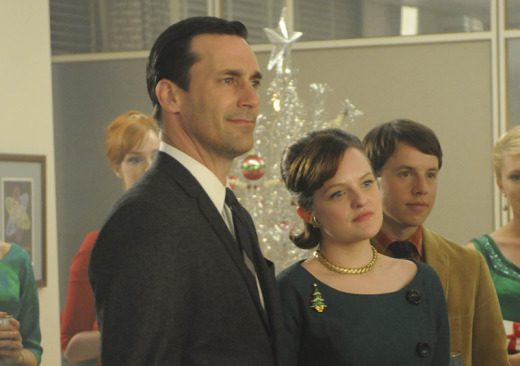
"All Hail Dracula!" - Someone Still Loves You Boris Yeltsin (mp3)
"Stuart Gets Lost Dans Le Metro" - Someone Still Love You Boris Yeltsin (mp3)
"Critical Drain" - Someone Still Loves You Boris Yeltsin (mp3)
